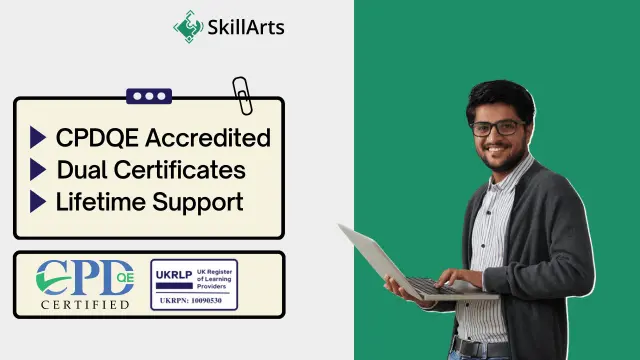
Python Programming & Coding - CPD Certified
Syntax | Line Structure | Strings | Variables | Booleans | Operators | Data Types | Functions
Skill Arts
Summary
- CPDQE Certificate on Python Programming & Coding Diploma - Free
- Reed Courses Certificate of Completion - Free
- Tutor is available to students
Add to basket or enquire
Overview
Why Study This Python Programming & Coding Diploma?
- According to industry insights, Python is one of the most sought-after programming languages, with a rising demand for Python developers in fields ranging from web development to data science and artificial intelligence.
- According to the UK Tech Salaries 2023 report by CodeinWP, Python developers earn an average salary of £55,000 per year.
- The demand for Python developers globally is expected to grow by 30% in the next five years.
- According to Indeed, the number of job postings for Python developers in the UK has increased by 50% in the past year.
Learning Outcomes:
- Delve into the foundational Python structures: strings, lists, and dictionaries.
- Familiarise yourself with Python's Object-Oriented Programming (OOP) concepts.
- Discover the process of crafting a Python program from the ground up.
- Grasp how to compute, fetch, and store data utilising Python variables.
- Master Functions in Python.
CPDQE Accreditation:
This Python Programming & Coding Diploma is CPDQE accredited. CPD is a globally recognised parameter for continuous professional development acknowledged by thousands of professional bodies, employers and academic institutions in the UK and around the world.
Dual Certificates:
After completing this Python Programming & Coding Diploma, you will receive a course completion certificate from Reed. Also, you will receive a CPDQE-accredited signed certificate from SkillArts.
Curriculum
-
Python Programming: Course Intro 04:37
-
Python Coding 101 51:11
-
Getting Familiar With Python 1:15:05
-
Python Data Types 1:29:27
-
Python Operators 52:35
-
Python Advanced Data Types 45:55
-
Python Control Flow 1 56:14
-
Python Control Flow 2 31:03
-
Intro to Functions 29:41
-
User Input and Error Handling 41:05
-
Advanced Functions of Python Programming 1:03:12
-
Scripting and Libraries 1:07:39
-
NumPy 58:06
-
Pandas 1:30:20
-
Intro To OOP 41:01
-
Advanced OOP 1:14:07
-
Career in Python 1:05:22
-
Python Programming: Final Exam 03:00
Course media
Description
Python Programming & Coding Course Syllabus:
- Python Coding Fundamentals
- Python Programming Introduction
- Advanced Python Programming
- Python for Beginners
- Python Job Market Insights
- Python Career Pathways
- Python Course Framework
- Securing a Python Role Without a Degree
- Python Installation Guide
- Python with Anaconda and Jupyter
- Python Commenting Techniques
- Python Syntax Essentials
- Python Line Structure Mastery
- Python Statements and Indentation
- Python Data Types Deep Dive
- Python Strings and Manipulation
- Python Variables and Data Structures
- Python Operators Comprehensive Guide
- Python Advanced Data Types
- Python Control Flow Mechanisms
- Python Functions Explained
- Python Error Handling Strategies
- Python Advanced Functions
- Python Scripting Essentials
- Python Libraries Overview
Who is this course for?
- Python & Data Scientist
- Financial Analyst
- Python Developer
- Python Data Analyst
- Individuals new to Python programming language
- Data Scientists transitioning to Python from other analytical tools
- Aspiring Python Data Analysts
- Newcomers to Python development and coding
Questions and answers
Currently there are no Q&As for this course. Be the first to ask a question.
Certificates
CPDQE Certificate on Python Programming & Coding Diploma
Digital certificate - Included
Reed Courses Certificate of Completion
Digital certificate - Included
Will be downloadable when all lectures have been completed.
Reviews
Legal information
This course is advertised on reed.co.uk by the Course Provider, whose terms and conditions apply. Purchases are made directly from the Course Provider, and as such, content and materials are supplied by the Course Provider directly. Reed is acting as agent and not reseller in relation to this course. Reed's only responsibility is to facilitate your payment for the course. It is your responsibility to review and agree to the Course Provider's terms and conditions and satisfy yourself as to the suitability of the course you intend to purchase. Reed will not have any responsibility for the content of the course and/or associated materials.


